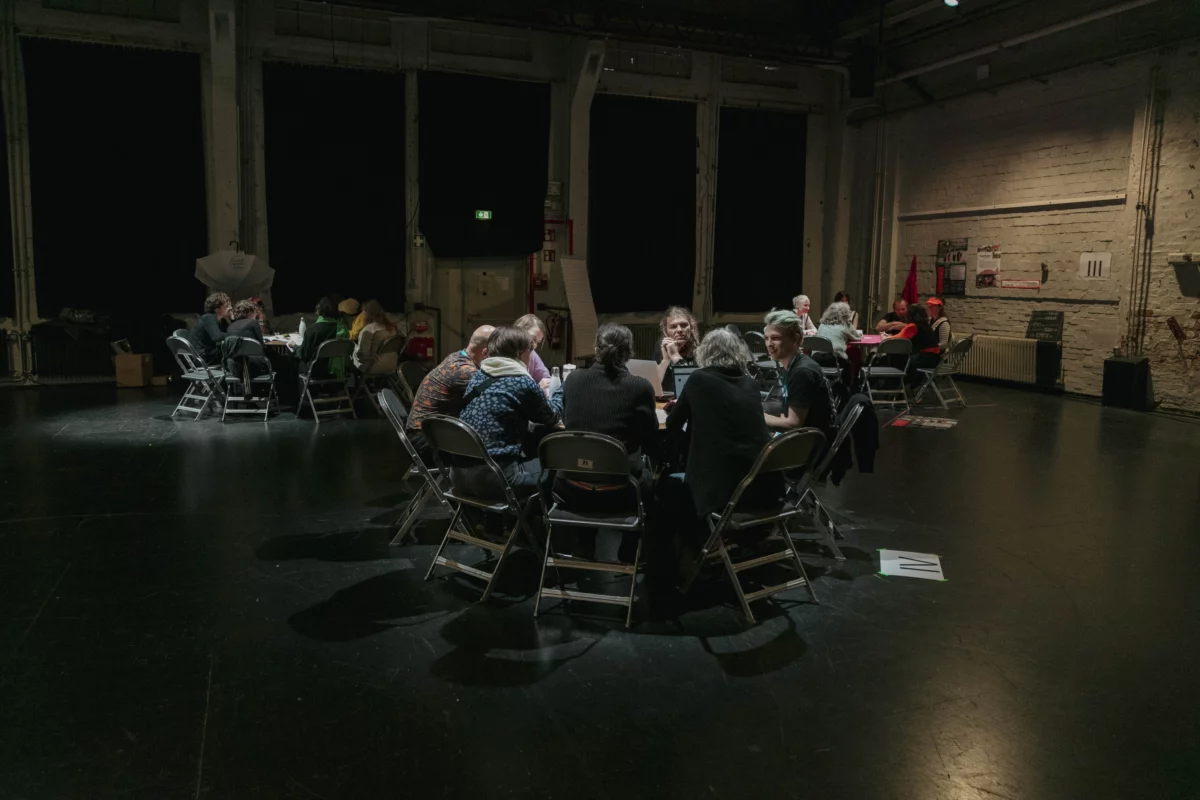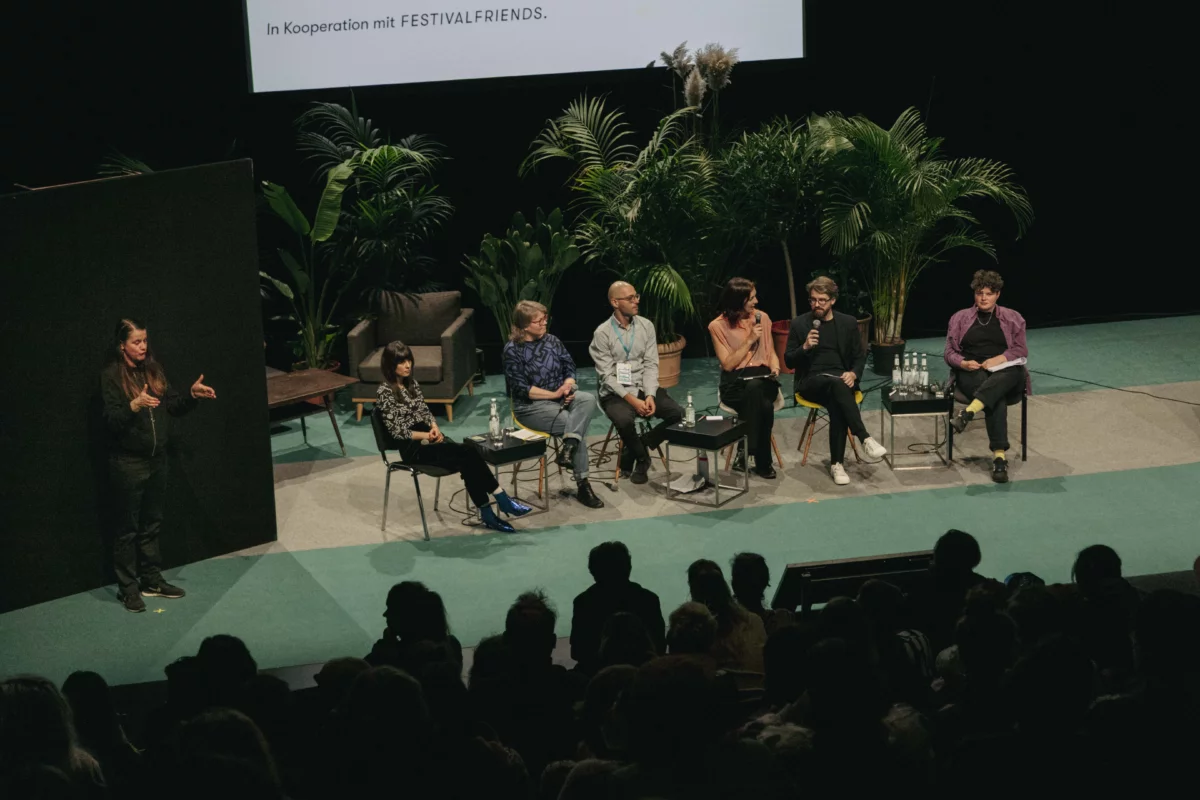"There are still many of us"
By Elisabeth Wellershaus
At the B.A.L.L. at Kampnagel, there was intense discussion about how to meet the challenges of the present. Many artists also offered their opinions on how to deal with right-wing populist politics and right-wing extremist dangers. An approach to resistant arts.
"What gives you strength?" That is a frequently asked question during the B.A.L.L. weekend at Kampnagel. It comes up in panel discussions, in hallway encounters, in workshops or at the bar. Everywhere where conversations revolve around current news situations and general overload – and also where things become more specifically political. At some events, for example, the challenges and dangers posed by right-wing positions taking up more and more space are clearly stated. And in the independent scene in particular, new forms of solidarity seem to be emerging in the search for an appropriate response.
Again and again this weekend, I meet people who don't want to give in to hopelessness. People who confront political situations without allowing themselves to be taken over by them as artists. This is particularly evident in those formats where the audience is explicitly encouraged to become part of the debate.
I’m attending one of these events on Saturday morning in Hall K4. It's called „Kunst des Gemeinsamen. Ein Intervisionsparcours“ (“Art of the collective, an intervention parkour”) and offers a kind of speed-dating in the lab jungle – where participants can learn about at least 10 different lab projects. We are supposed to work our way from station to station in small, randomly formed groups of visitors. After one or two team-building tasks, my group sits at the table of the „FESTE FEIERN" lab.
Sandra Bringer and Carola Lehmann's project focused on how encounters are celebrated in rural areas. Their team mainly looked at eastern German regions and focused on which social and political groups are often present at festivals there. Which ideas of home and identity circulate between them. In a wide variety of formats – from playground festivals with hands-on activities to town walks in garish costumes – they explored how performing artists can support some moments of encounter and debate and came away with the following insight: When the AfD and the New Right use means of fictionalization to construct realities, they want to remember that this is actually "a privilege of art".
 © Alexandra Polina
© Alexandra Polina
After spending 10 minutes with the initiators of "FESTE FEIERN," some music is played and it’s time to move on to the next station. It's amazing what can be conveyed in such a short time, how an audience can get involved in conversations and small actions. At the next tables, we gather information about art in public spaces, and Clair Howells from the Artist Lab „Stadt Land Neu“ ("Town Country New") engages us in a conversation about forms of encounter beyond our own bubbles. Elsewhere, we learn about how the joint development of digital horror games can also connect people in an analog way and about the work of the Akademie der radikal Sorgetragenden (Academy of radical carers).
We also learn something new during our short visit to the activists of the Staub zu Glitzer collective. The „Organizing Cultural Commons“
lab team reports on the occupation of Berlin's Volksbühne theater, their collaboration with the Berlin hospital movement, the Union für Obdachlosenrechte (Union for Homeless Rights) and Omas gegen Rechts (Grannies against the Far Right). They speak of their longing for a theater where everyone feels welcome and of the attempt to open up German theaters collectively. The atmosphere on this morning is full of glitter and confetti. It smells of delicate connections, of trial-and-error and of probing those social voids that can be explored again and again in encounters with changing audiences.
 © Alexandra Polina
© Alexandra Polina
Anica Happich, Frauke Wetzel, Hamid Mohseni, Anne Schneider, Steffen Klewar and Marietheres Jesse (from left) discuss strategies and positions against right-wing backlashes.
In the afternoon, socio-political issues are negotiated in a more classical setting. However, in Hall K2 there are also people sitting on the panel who are trying out new models of exchange. This panel discussion is about "Strategies and positions against right-wing backlashes." Anica Happich, Steffen Klewar, Hamid Mohseni, Marietheres Jesse, Frauke Wetzel and moderator Anne Stein have come together to talk about their experiences. They are looking for answers to social developments in which right-wing populist and far-right forces are increasingly shaking up heterogeneous communities and democratic structures. Where belittlement, exclusion and social injustice are on the rise. And it doesn't seem to be an option for anyone in the group to allow themselves to be driven into a state of inaction out of fear of far-right violence.
Anica Happich has been the director of the Phoenix Theater Festival for three years and, as a board member of the Thuringian Theater Association, is focused on the abandoned cultural sites and forgotten stories in the region. Hamid Mohseni has been working in the mobile advisory service against right-wing extremism in Berlin since 2017. Marietheres Jesse is part of the queer-feminist FLINTA collective CHICKS* and has herself experienced the defamation of her work and threats from the far-right. Frauke Wetzel works in political education and is currently leading the “Neue unentdeckte Narrative” (“New undiscovered narratives”) project in Chemnitz. And Steffen Klewar, as program director of the Fonds Darstellende Künste, is well aware of how right-wing propaganda can also exert extreme pressure on artists and venues at a structural, cultural-political level. The five guests work with a wide variety of methods to counter the appropriation of art and the narrowing of ideas, and they clearly identify the challenges of the current era. They speak about the difficulty of navigating a society that closes itself off between populist agitation and a hardening toward "foreign" realities of life – which cements its attitudes into ever more rigid positions.
At the beginning of the event, Daniela Nicoló and Enrico Casagrande from the Motus theater group gave a keynote speech, followed by a talk by performance artist Gin Müller. All three described the repression in their home countries of Italy and Austria, the political efforts to make cultural encounters impossible and to prevent cross-societal solidarity. Nicoló and Casagrande spoke about the increasingly narrow scope for action and about theater makers who come under pressure in Italy not to address certain topics on stage in the first place – for example gender and migration. Müller talked about how right-wing groups in Austria make use of left-wing resistance practices and stage themselves spectacularly in terms of media and marketing. But when he concludes his lecture with photos of queer-feminist actions, showing pictures of the “Perversen Heimatpartei” (“Perverse Homeland Party”), the mood in the room turns from tense to amused.
During the panel discussion that follows, Steffen Klewar says that events like this are giving him strength right now. "There are still a lot of us," he says. "We just need to see and recognize each other – beyond the differences." Anica Happich agrees with him. And when she looks into the audience, she spots Maja, an older lady who introduced herself to me a few hours ago as a member of Omas gegen Rechts. "I saw you at a demonstration in Pankow the other day," she calls out to her from the stage. Because sometimes we already recognize each other.